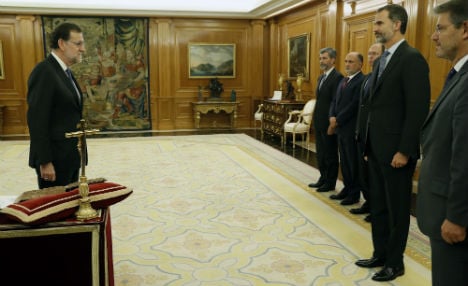Spain's conservative leader Mariano Rajoy was sworn in on Monday for a second term as prime minister, bringing a close to 10 months of political limbo.
“I swear to faithfully fulfil the obligations of prime minister and to show loyalty to the king,” Rajoy said with his hand on the Spanish constitution, at a ceremony attended by King Felipe VI and broadcast live on national television.
Mariano Rajoy Brey juró ante el Rey su cargo como Presidente del Gobierno en el Palacio de la Zarzuela https://t.co/pkDN0sN228 pic.twitter.com/nUUIeED6ms
— Casa de S.M. el Rey (@CasaReal) October 31, 2016
Rajoy, leader of the conservative Popular Party (PP), is set to spend the next three days forming a new cabinet for his hard-won minority government.
A senior party source said he was staying tight-lipped about his cabinet picks, planning to notify ministers of their new jobs “a half-hour before”.As the conservative political survivor takes the helm for a second term he will be faced with unprecedented opposition as he grapples with painful economic reforms and resurgent Catalan separatism.
The 61-year-old prime minister has been at the helm of a provisional government without full powers for the last 11 months following inconclusive elections in December 2015 in which his Popular Party (PP) lost its absolute majority despite coming first. New elections in June once again failed to hand him an absolute majority.
He is expected to name his new cabinet on Thursday after which he will need to submit a budget to parliament for approval after a delay of several months – a difficult task given that he commands the votes of just 137 of Spain's 350 lawmakers in the lower house.
If Rajoy is able to persuade enough parliamentarians to back – or not oppose – his taxation and spending plans, he will still face the scrutiny of the European Union which will want to know how the country will reduce its structural deficit to below three percent of GDP for 2017.
But it may prove impossible for Rajoy to secure enough parliamentary support while meeting the terms laid down by Brussels.
To slash the deficit Rajoy will be faced with the thankless task of either cutting spending by €5.5 billion ($6 billion), angering the left on whose support he may depend to get the budget passed, or hiking taxes, a move that could draw the ire of business and jeopardise investment.
The country has the second highest unemployment rate in the EU – second only to Greece – at 18.9 percent, which coupled with a pensions crisis exacerbated by an ageing population, threaten Spain's fragile green shoots of growth.
His best hope would be to appeal to parliament's 32 centrist Ciudadanos members.
Alongside the economy, Rajoy will be forced to grasp the thorny issue of Catalonia, Spain's wealthy northeastern region where an independence movement has gathered pace since Rajoy first came to power in 2011, according to constitutional law professor Javier Perez Royo.
One columnist has argued in the right-wing daily La Razon that on the pressing, non-economic issues facing Spain – like Catalonia – an “agreement between the PSOE and the PP is necessary”.
Catalan regional president Carles Puigdemont has vowed to press ahead with an independence referendum next year if Madrid refuses to negotiate.
'Work to do'
“As long as the Catalan question is not resolved, we will have a knotty issue,” said Royo who added that the issue has divided the left so seriously that it has been unable to unite to take power from Rajoy.
Far-left party Podemos has said that it supports a referendum on Catalan independence while the PSOE does not.
“The nationalists are going to be key to governing,” according to sociologist Narciso Michavila who was formerly an adviser to Rajoy. Nationalist parties, along with the independents, control 30 seats in parliament – enough to block laws in the event of razor-thin margins.
To resolve the Catalan issue, the PSOE has called for reform to the country's constitution to adopt a more federal system.
But changing the country's basic law could prove to be an uphill battle – the document has only been tweaked twice since it was adopted in 1978, and alterations require support from two-thirds of lawmakers.
“Given the situation, nothing will happen,” said legal expert Royo.
On these major issues confronting Spain as it emerges from years of economic and political uncertainty, Rajoy will need a reliable opposite-number in the PSOE party to negotiate compromises and secure their support, one bill at a time.
But the party, which has 85 seats in parliament, was thrown into disarray at the start of October when its leader Pedro Sanchez was ousted in a rebellion.
Sanchez however on Sunday said he would try to return as head of the party and also seek a rapprochement with Podemos.
“I have the desire, the will and the strength to do it,” Sanchez said when asked in a television interview if he would put himself forward at the next party congress.
The PSOE opted to let their arch-rival govern rather than risk an electoral drubbing in the third elections in a year in a country tired of going to the polls.
Rajoy captured the mood when he tweeted following parliament's vote on Saturday evening: “We have a lot of work to do.”
By Michaela Cancela-Kieffer



 Please whitelist us to continue reading.
Please whitelist us to continue reading.
Member comments